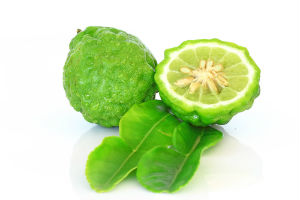Bergamot Fruit
- Bergamot is a plant that produces a type of citrus fruit. Oil taken from the peel of the fruit is used to make medicine.
- (Bergamot Oil (Bergaptene Free) (Citrus Bergamia Oil) is an essential oil that is derived through cold compression (as opposed to the steam distillation process of many other essential oils).
- Bergamot Oil has a fresh, sweet, citrus scent with warm, spicy floral qualities. Its aroma tends to have an uplifting and relaxing effect. It is good for combating stress, building confidence and enhancing your mood.
Contents
Uses
- Because Bergamot oil has powerful antibacterial, analgesic, antiseptic, anti-inflammatory, antispasmodic, and soothing effects, it can be used in the treatment of depression, stress, tension, fear, hysteria, infection (all types including skin), anorexia, psoriasis, eczema and general convalescence.
- Bergamot Oil has a long history of use in potpourri and perfume recipes and can found in products such as creams, lotions, soaps, and suntan oils. Despite the fact that the bergamot fruit is inedible, the oil has many culinary uses, most commonly as a citrus flavoring agent in gelatins and puddings.
Cautions
- Children: Bergamot oil is POSSIBLY UNSAFE in children when taken by mouth in large amounts. There have been serious side effects, including convulsion and death, in children who have taken large amounts of bergamot oil.
- Pregnancy and breast-feeding: Do not use bergamot oil on your skin if you are pregnant or breast-feeding. It is POSSIBLY UNSAFE.
- Diabetes: Bergamot might lower blood sugar levels. This could affect blood sugar control in people with diabetes and cause blood sugar levels to go to low. Monitor your blood sugar closely.
- Surgery: Bergamot might lower blood sugar. There is some concern that it might interfere with blood sugar control during surgery. Stop using bergamot at least 2 weeks before a scheduled surgery.
Interactions
Moderate Interaction, be cautious with this combination:
- Medications that increase sensitivity to sunlight (Photosensitizing drugs) interacts with BERGAMOT. Some medications can increase sensitivity to sunlight. Topical use of bergamot oil might also increase your sensitivity to sunlight. Using bergamot oil topically along with medication that increase sensitivity to sunlight could increase the chances of sunburn, blistering or rashes on areas of skin exposed to sunlight. Be sure to wear sunblock and protective clothing when spending time in the sun.
- Some drugs that cause photosensitivity include amitriptyline (Elavil), Ciprofloxacin (Cipro), norfloxacin (Noroxin), lomefloxacin (Maxaquin), ofloxacin (Floxin), levofloxacin (Levaquin), sparfloxacin (Zagam), gatifloxacin (Tequin), moxifloxacin (Avelox), trimethoprim/sulfamethoxazole (Septra), tetracycline, methoxsalen (8-methoxypsoralen, 8-MOP, Oxsoralen), and Trioxsalen (Trisoralen).
References
Source: WEBMD, web article (user reviewed), www.webmd.com

